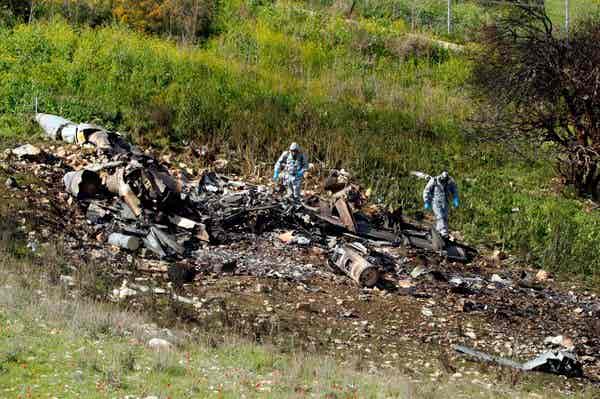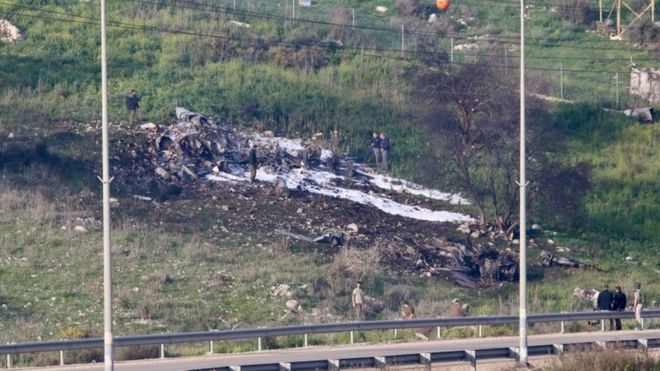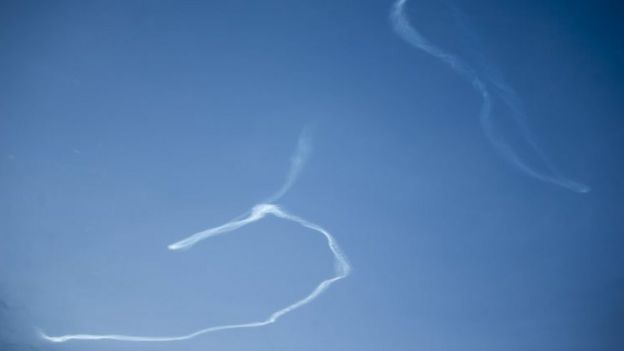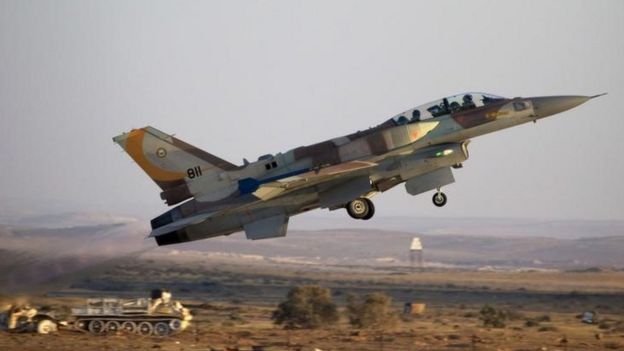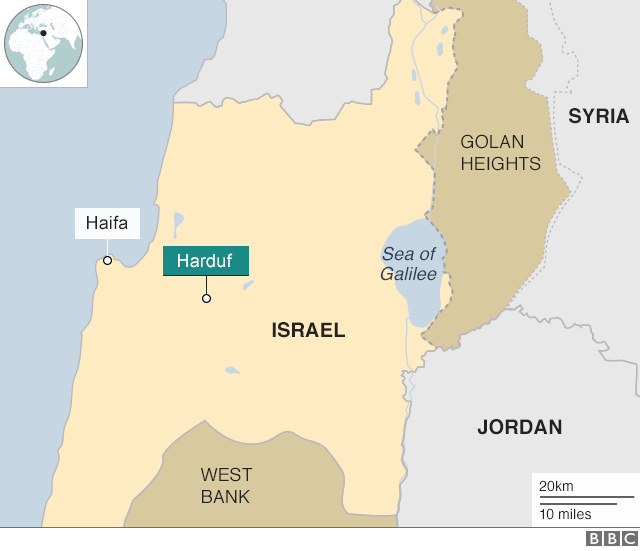Israel Strikes Iran in Syria, Losing Jet, as Conflict Moves Into Perilous Phase
Image
Pieces of an Israeli F-16 that crashed in northern Israel on Saturday after coming under antiaircraft fire. The pilot ejected, according to a military spokesman. CreditJack Guez/Agence France-Presse — Getty Images
By
Isabel Kershner
Feb. 10, 2018
JERUSALEM — Israeli, Syrian and Iranian military forces clashed on Saturday in a series of audacious strikes that could mark a new and dangerous phase in both a long-simmering cross-border conflict and Syria’s long civil war.
The confrontations began before dawn when Israel intercepted what it said was an Iranian drone that had penetrated its airspace from Syria, and the Israeli military said it then attacked what it said was the command-and-control center from which Iran had launched the drone, at a Syrian air base near Palmyra.
One of Israel’s F-16 fighter jets crashed in northern Israel on its way back from the mission after coming under heavy Syrian antiaircraft fire, believed to be the first Israeli plane to be lost under enemy fire in decades.
That prompted a broad wave of Israeli strikes against a dozen Syrian and Iranian targets in Syrian territory. The Israeli military said it hit eight Syrian targets, including three aerial defense batteries, and four Iranian positions that it described as “part of Iran’s military entrenchment in Syria.”
The events, including Israel’s direct engagement with Iranian forces, risked escalating the intensifying crisis in Syria, where forces from Russia, Turkey and the United States are also on the ground in a war with multiple fronts and multiple factions, including the remnants of the Islamic State and other Islamist militant groups.
Israel has long warned about the risk of conflict as Iranian forces and their allies, including Hezbollah, the Lebanese militant group militia, have dug in on Syrian territory and approached the boundary with the Israeli-held portion of the Golan Heights. Israel, which considers Iran its most potent enemy in the region, has been lobbying world powers — so far, apparently, without success — to distance these forces from the border areas.
Israel seized the strategic plateau from Syria in the 1967 war and fought off an invasion there in 1973. Though the area remained quiet for decades, it has become a growing flash point in Syria’s war.
Israel has carried out scores of strikes in Syria in recent years, largely targeting what it says are advanced weapons stores or convoys taking weapons to Hezbollah in neighboring Lebanon. Israel has also reportedly hit Syrian government facilities involved in weapons development and an
Iranian base under construction in Syria.
But this was the first Israeli strike on a site where Iranian forces were present, analysts
said, and Israeli military officials said this was the first time an Iranian drone had penetrated Israeli airspace during the Syrian war.
The officials said they were investigating the purpose of the drone. There was no immediate indication that it was armed.
Israeli military officials accused the Syrians and Iranians of “playing with fire,” but indicated that Israel wanted to contain the situation.
“We are ready to exact a very heavy price from whoever acts against us,”
said Brig. Gen. Ronen Manelis, the chief spokesman of the Israeli military, “but we are not seeking an escalation.”
The jet crash represented a severe blow to Israel’s prestige and could mark a major change after years in which it acted against targets in Syria with relative impunity.
In the past, Syria has
claimed, falsely, that it had shot down Israeli aircraft. The last time an Israeli jet was downed under enemy fire appears to have been in the early 1980s.
Hezbollah said on Saturday that the downing of the Israeli F-16 jet by the Syrian army marked the “start of a new strategic phase,” which would limit Israeli exploitation of Syrian airspace. “Today’s developments mean the old equations have categorically ended,” the Lebanese Shiite group said in a statement.
But just as Syrian self-confidence appears to have grown, Israel also sent a strong message with its broad wave of strikes on Saturday, Israeli analysts said. They noted that this was the first time in recent years that Israel struck Syrian territory in broad daylight. Despite more Syrian antiaircraft fire, all Israeli jets returned to base safely from the second mission, after the first jet was lost, according to the Israeli military.
Prime Minister Benjamin Netanyahu of Israel spent much of Saturday in consultations with his defense minister, the Israeli chief of staff and other military officials.
The Russian Foreign Ministry issued a statement calling on “all sides involved to show restraint and avoid all acts that could lead to complicating the situation further.” The ministry added: “It is absolutely unacceptable to create threats to the lives and security of Russian soldiers that are in the Syrian Arab Republic on the invitation of the legal government to assist in the fight against terrorism.”
After a meeting with President Vladimir V. Putin in Moscow two weeks ago, Mr. Netanyahu said in a statement that Israel viewed with “utmost gravity” Iran’s efforts to establish a military presence in Syria, and said he had made clear to Mr. Putin that Israel would “act according to need.”
Russia, along with Iran, has been helping prop up the government of President Bashar al-Assad in Syria.
In the view of Israeli analysts, Syria, Iran and Russia would appear to have little interest now in getting into a full-blown conflict with Israel.
“Israel has the capability to destroy the Russian and Iranian project to save the Assad regime,” said Amos Yadlin, a former chief of Israeli military intelligence and now the director of the Institute for National Security Studies at Tel Aviv University. “This is not the weak Syrian opposition,” Mr. Yadlin said in an interview. “This is strong Israel.”
Because of what he called the “overwhelming Israeli reaction” to the downing of the jet, Mr. Yadlin said he thought there was “a high chance of containment.”
The Iranian Foreign Ministry denied the drone had strayed into Israeli airspace and rejected as “laughable” reports that Israel had intercepted a drone launched from Syria. “Iran’s presence in Syria is limited to advisers at the request of its legitimate government,” an Iranian Foreign Ministry spokesman, Bahram Qasemi, was quoted as saying by the official Islamic Republic News Agency.
Syrian Army officials said the drone had been carrying out a routine mission against the Islamic State, also known as ISIS or ISIL, over Syrian airspace,
according to the news site Al-Manar.
Lt. Col. Jonathan Conricus, another spokesman for the Israeli military, insisted that the drone was “on a specific Iranian mission,” and was shot down deep in Israeli territory.
Still, some Israeli analysts did not discount the possibility that the Iranian drone had crossed into Israel because of a malfunction.
“I fail to see the logic behind the Iranians sending a drone to Israel,” said Ehud Yaari, an Israeli television analyst of Arab affairs and an Israel-based fellow of the Washington Institute for Near East Policy. “They have other priorities right now in Syria.”
But once it had crossed into Israeli airspace, the Israelis had no choice but to respond, Mr. Yaari said.
He added, “The almost constant friction between the Iranian presence in Syria and the Israeli Army is taking its toll.”
The semiofficial Iranian news agency ISNA quoted a deputy commander of the Revolutionary Guards, Hossein Salam, as saying, “We can destroy all American bases in the region.” He added: “From this very location, we can create an inferno for the Zionists.”
The remarks were seen as a warning by Iran to the United States to rein in Israel.
It was not immediately clear if the Israeli F-16 was directly hit by the Syrian antiaircraft fire. Early assessments suggested that it was, Colonel Conricus said, though he added that nothing had been officially confirmed.
The Israeli military said two pilots
had bailed from the downed aircraft “as per procedure.” One pilot was severely injured as a result of “an emergency evacuation,” it said.
The Israeli military said that a combat helicopter intercepted the Iranian drone before dawn on Saturday.
“The aircraft was identified by the Aerial Defense Systems at an early phase and was under surveillance until the interception,” the military said, adding that it “attacked the Iranian aircraft’s launch components in Syrian territory.”
The second wave of strikes included sites near the capital, Damascus, according to Syrian state media and Damascus residents.
The sounds of explosions could be heard near Kiswa and Jdeidet Artouz, suburbs to the south and to the west of Damascus, residents said.
There was also what sounded like the launch of rockets or missiles from Mezze air base, in Damascus. Syrian state television said the Syrian military’s antiaircraft guns were responding to Israeli airstrikes.
Later Saturday, air-raid sirens sounded in the Israeli-held Golan Heights and in the Galilee area of northern Israel, though there were no immediate reports of incoming fire.
The clash showed the extent to which Syria has become a battlefield between Israel and Iran, among many other intersecting conflicts involving foreign combatants.
Reporting was contributed by Anne Barnard and Nada Homsi from Beirut, Lebanon; Rod Nordland from Tal Abyad, Syria; Thomas Erdbrink from Tehran; Ivan Nechepurenko from Moscow; and an employee of The New York Times from Damascus, Syria.
A version of this article appears in print on February 10, 2018, on Page A9 of the New York edition with the headline: Israel Unleashes Military Attack on Syria After Iranian Drone
https://mobile.nytimes.com/2018/02/...n-syria.html?referer=https://news.google.com/
.






